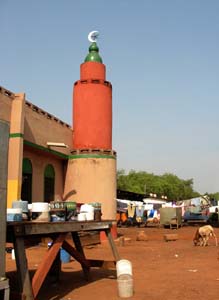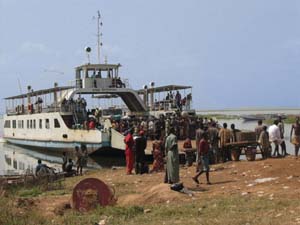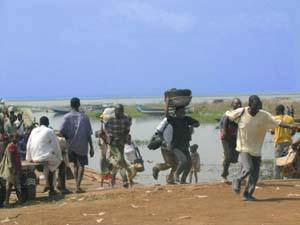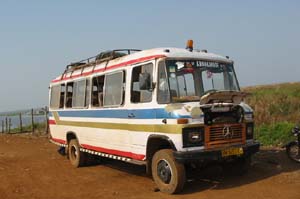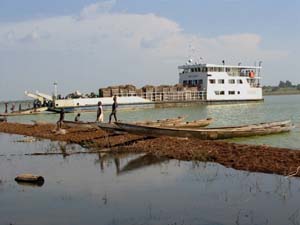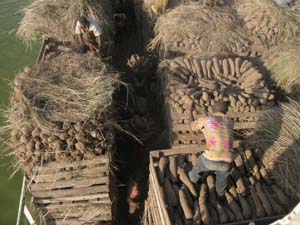|
Snippit of Ghana 2003 We
start in Tamale in northern Ghana in the wee hours of the morning at
the OSA bus station to catch a bus to Makongo. Our ultimate destination
is the Yepai Queen, the cargo ferry that plies lake Volta. This is a
Muslim area of the country and morning prayer is broadcast throughout
the station. Our friend Awudu is there to see us off and when the bus
pulls in there's the usual frenzy of people cramming on to the bus.
My innate politeness causes me to stand patiently waiting to get on.
Then I hear my name called and I see Awudu inside the bus; he has scrambled
in a side window (he's a natural in the melee), and got us seats. |
|
We sit in
the shade of a truck and wait for the ferry to arrive, sharing the
pineapple that I bought in Tamale for 50 cents which is rather expensive
since we'd been paying 25 cents further south (but that is where they
are grown, the vendor explained; ah ,but I still got her to knock
a 1000 cedi off the price). The bus we were on (it carries about 50
people) also waits for the ferry to arrive and will take those passengers
back to Tamale.
|
|
the metal bowl on her head
that is used to carry goods. Soon the running and hurry is explained.
There are more people than seats on the bus and those that don't get
on will have to find other ways.
That little scene complete, the much smaller group loads the ferry in a downright orderly and cordial fashion. As is typical in Ghana, two teenage boys attach themselves to us, asking questions and giving us the inside scoop of how things work in their country and Yegi in particular. In Yegi it's a long, hot afternoon waiting for the cargo ferry. The shade and benches of the waiting area help and we take turns with the Dutch fellows watching our stuff and taking short walks to find water and snacks. There is much speculation about whether the four of us actually |
|
We find the bridge and the captain. I explain that we
have reservationsfor the cabins and tell him the name of the person
I spoke with. There's much laughter from the captain and his his crew
because of how pronounced the name. Well after after hovering, watching
and staking our claim we are given the rooms. Mark and Maren arrive
and we retire to our cabins, for the coolness of air conditioning (yes,
AC, the only time we had it in Ghana) and a soft bunk.
Why such the concern about the cabins you might ask. Well, the other option is to spend the 48 hours on tables and benches down below, and, as the guide book said, you'd have to be a masochist for that. So I can now say I have been in a first class cabin on a boat, but neither the boat or the cabin would be part of the Carnival cruise line brochures. Sometime in the early morning, the boat blared its horns and we were off. This is the yam time of year and the boat will stop at villages along the laketo load yams. The trip down the lake is quiet and fascinating. In the morning we take our first hot showers because we share the toilet and shower with the ferry crew. Tea, bread and hard boiled eggs in the galley for a dollar and we sit with the locals. There's a chicken tied at the bottom of the stairwell that Mark refers to as "dinner". |
|
The boat stops at the villages and the empty crates on the boat start to fill. The yams are loaded by hand, carried in bowls on the heads of the women, then the men pack them in the crates. The colors, the atmosphere, the camaraderie, are incredible. The abruni read, write, look at the scenery and watch the activity. |
|
We are nearing Akosombo, and the end of our journey.
It's dark and I am reclined on my bunk reading my book. I begin to hear
singing out on the deck and after a few moments I go out to investigate.
The group of women that have been camped on the deck are singing and
dancing. A wonderful rhythm and song. Us abrunis listen and sway. One
of the crewmembers comes up and explains that these women are Christians
and are singing their praise and thankfulness that we are reaching port
safely. This is not unfounded because when the boat was fully loaded
it was listing significantly to port and the yams had to be repositioned
and the bilge pump was working pretty hard to extract the water the
boat took on. As I'm swaying to the music one of the women comes up
to me and starts singing in English "I know, I know, I know Jesus
is my savior"
|
|
and I can tell she is making the effort in English and wants me to
join her. Ghana West Africa 2003h |
|
|
BridgeTree
Design ©2005
Email:
web@bridgetreedesign.com
